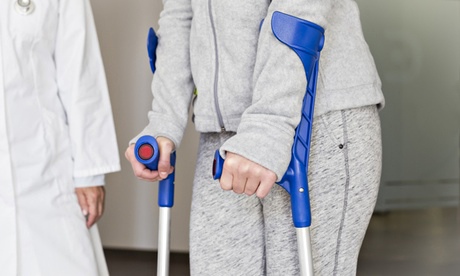
Two months ago, my marathon dreams were shattered by a terrible feeling in my knee. I was 24.6 miles into my race, but the pain was so intense that it stopped me in my tracks.
When I set off, all I could consider was how long it would take me to get around the course. Not finishing was unthinkable. I had trained six days a week for four months, clocking up 50 miles a week. I had risen at 6am to run along dark canalside paths, spent a fortune on sports massages and consumed more protein shakes and bowls of porridge loaded with peanut butter than any human being ever should. What I'm saying is that this was a big deal for me.
But, I have since learned, all that effort came to nothing because I have a stress fracture to my femur. This injury – just where the bone meets the knee – will have built up over time, reaching a peak during the race. My doctor has told me that running any further would probably have resulted in a total break, so I can only say thanks to my nervous system for the heads-up.
Two months on, I'm still on crutches. I have also learned how to carry a cup of tea while hopping. It has been quite a journey – both physically and emotionally. Almost all runners experience injuries and I'm no stranger to them myself, but this one is different. I can't stand on my right leg and running will be out of the question for a long time.
In a bid to deal with my situation, I am digging deep and embracing this notion of the "journey". I have been keeping a journal, talking about my feelings and crying – a lot. It all helps with the recovery. Being a runner who is unable to run is cruel. To non-runners, this probably sounds melodramatic, but I feel as if I have been banned from doing the things I love most about life.
I find great comfort in other people's stories about their own injuries. I am lifted by my rehab sessions at the Isokinetic clinic, where many of my fellow patients are on longer recovery paths than I. I have also taken my turn offering support to runners who are suffering similar setbacks.
Kathrine Switzer is a hero of mine. In 1967 she became the first woman to run the Boston marathon. She has since devoted her life to women's running. It was in the 261 women's marathon – a race that Switzer was the public face of – that I sustained my injury. She dried my tears in the ambulance and has since been a source of warm advice.
She even wrote to me about a major back injury that took her out of running for 18 months: "I realised running was my 'high', my endorphin kick, my stress-buster and now that I didn't have it for the first time in two decades, I got scared that I might lose that sense of wellbeing. I craved it like a drug addict and wasn't sure I was going to have the life I wanted without it.
"Instead of moaning that you are injured, take the extra time and produce something else that will give you a great sense of accomplishment. Honestly, that is how all my books have gotten written."
I'm not sure my whiny injury journal will make a bestseller in Waterstones, but feeling like I am doing something is a mental saviour.
A physio and paralympian friend of mine, Noel Thatcher, also shared his story with me: "My worst injury occurred one month before the 1997 Atlanta Paralympics where I was due to tackle the 5K, 10K and marathon treble. I was training in Japan, day in and day out, running 130-mile weeks in 30C heat. Not surprisingly, I developed a pain in my left shin that at its worst stopped me running at all. A bone scan revealed a stress fracture and I was told I would have to pull out by the team physio. My response is probably best left unrecorded but I was determined not to waste four years work.
"With the invaluable support of medical staff, team mates, friends and family I focused on the sole objective of making the start line. By some miracle, I not only made the 10K but won it in what was then a world-record time. With the weight of expectation off my shoulders I also won the 5K a few days later (but had to pull out of the marathon as the fracture had got larger). Weirdly, I doubt that, without the injury, I would have had the focus and determination to run as hard as I did.
"If you are injured, it can be heart-breakingly frustrating. But, if you apply yourself to the process of recovering as well as you do to the process of training, you will be a better, stronger and wiser runner. I guarantee it."
So, for me recovery is about playing the long game. I am so tired of leg-raises and aqua jogging, but these are the things that I need to do to get back on track. Being injured is rubbish but if I apply a little perspective, I know that it everything is going to be OK . But for now, I also know that there will be a few more tears, that I will fall over on the pavement when my crutches lose their grip a few more times, that I will feel irrational pangs of jealously towards other runners. But I also know that I will ride this out and come back a whole lot wiser.

